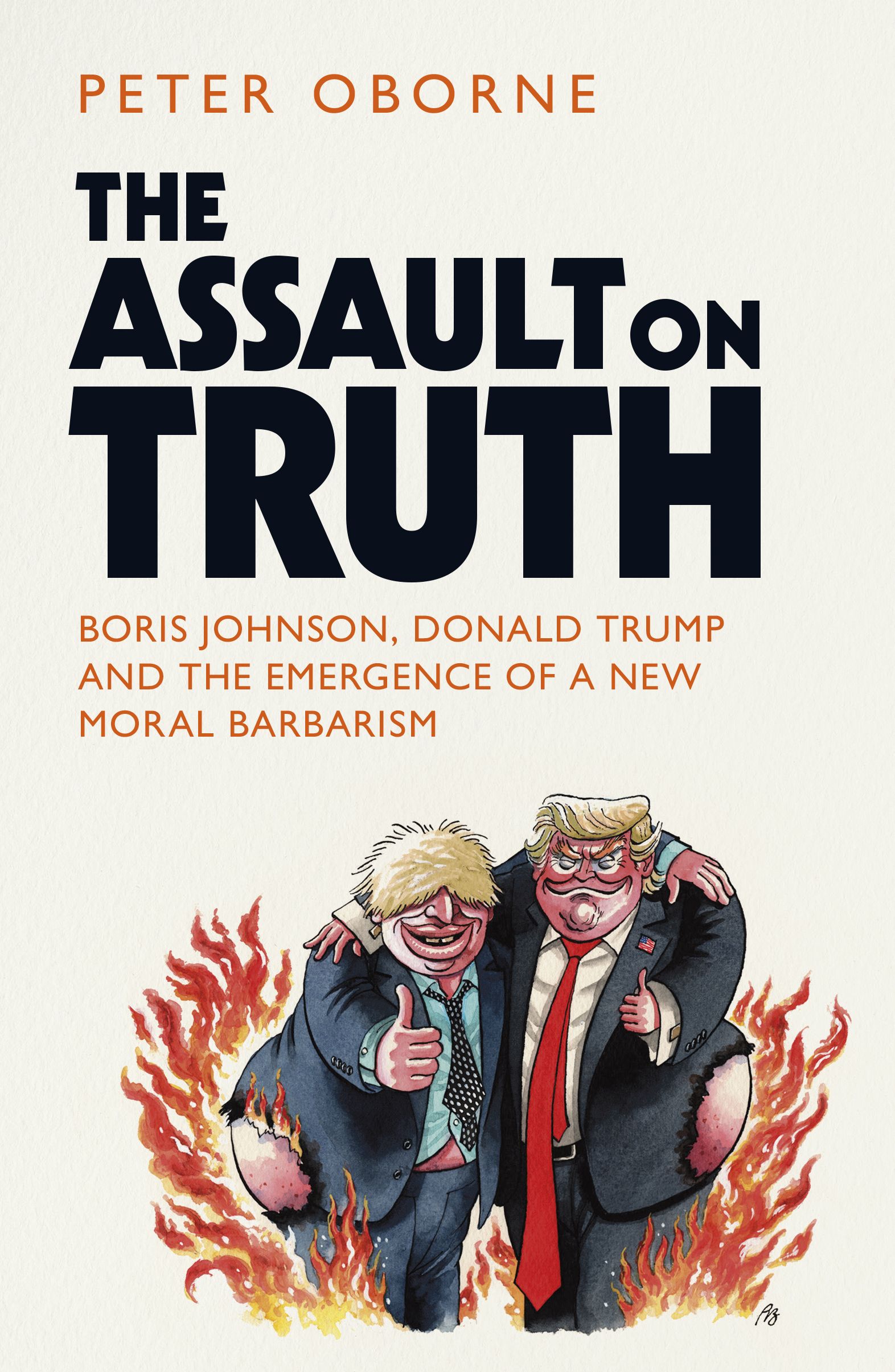Support NewsLeaf.com from as little as £1 by donating via PayPal. Click here to donate.
Cutting. Honest. Brutal. When tackling a topic as slippery as ‘the truth’, the most difficult of tasks for any writer is to cut through the noise and make the reader believe you. This is a particularly thankless task in 2021. The biggest raconteur of ‘alternative facts’ – Donald Trump – may be out of office, but the damage of four years of the Commander in Chief being the Fabricator in Chief has made it difficult to ever reach across the aisle to those with a more liberal conception of the truth.
Despite the book’s subtitle naming Donald Trump alongside Boris Johnson, this book is decidedly about the British prime minister. References to the former president are throughout – pinned up as the ultimate pervader of untruths – but these are made in reference to a student vs master between the transatlantic leaders. There have been dozens of books about the suitability of Boris Johnson for high office; character assassinations and Oxford memoirs; but The Assault on Truth takes a systematic look – lie by lie – at the mistruths told by politicians in the Johnson ministry, and the impact it has had on British politics, whilst pushing back against pervasive narratives that don’t necessarily take account of the full picture.
Peter Oborne’s commitment to cutting honesty begins with his assessment of a young Johnson: “charming, intelligent, amusing”, a clear olive branch to those who pick up the book with a different perspective from the author. An honest assessment of a talented individual with clearly lofty goals. This commitment to giving his honest view is clear throughout the book, even commenting on how Trump’s candour “makes it possible to like him” – something hard to disagree with when watching back his pre-presidency Comedy Central roast. Occasionally, it is possible to see what his voters see in him. Oborne also grants Boris Johnson significant power in shaping modern Britain and the orchestration of public opinion over an issue that would eventually result in his ascent to prime minister.
Oborne goes further than perhaps any other writer in suggesting that Boris Johnson’s liberal approach to the truth whilst with the Daily Telegraph in Brussels – including copious details added to half-true stories on EU monitoring of ‘smelly’ British farms – impacted the shape of British public opinion. A direct thread ran from his days in the early 1990s, offering juicy (often untrue) details of the driest political institution in existence, to his Brexit-fuelled ascent to the British premiership in 2019. Far from just adding details that made the EU a worthy topic to discuss over a pint, Boris Johnson shaped how Britain viewed the EU. This is an assessment that is hard to disagree with: a Boris Johnson article that landed in Margaret Thatcher’s ‘red box’ in 1990 reportedly led to her “No, No, No” speech. The catalyst for her downfall later that year.
The commitment to honesty in his often-favourable assessment of Johnson, in a book designed to comprehensively bring him down, is stark in the commitment to referencing throughout. Almost no statement is made, or opinion presented, without citing where it first originated. In an effort to systematically attack statements made by Johnson, with no room for liberal interpretation of where the true ground lies, there is commitment to proving them wrong. In his introduction, Oborne states his commitment to providing “irrefutable evidence” that politicians – namely the prime minister and his lackies – lie. This seems obvious, we all know politicians lie, but it is a duty that Oborne takes incredibly seriously and ensures that no statement goes without thorough scrutiny and is always placed in the context in which they were made. Unlike statements made by the politicians he laments, there is no room for interpreting what Oborne means. There is no hot air.
Also read:
- Muslims in South London distribute free food to those in need
- Fear of Feminism
- Biden’s first major challenge is to bring adults back into an executive whose power had been diluted by Twitter spats and toxic masculinity
- What have Muslims been up to?
The Assault on Truth differs itself from competing books by not going after the half-truths and outright falsehoods parroted by Johnson or others as some kind of inherent character flaw; except as barefaced opportunism. Instead of suggesting that Johnson simply lies for the sake of lying (though he does suggest this for Trump) he makes it clear that the past two decades of politics have set the scene for what we see today, and that the British electorate are willing to accept different facts.
Politicians today – often without the scruples of their predecessors – are simply taking advantage of this, Oborne suggests. Beginning with Tony Blair, the integrity we saw with Margaret Thatcher and John Major, or the lie-fuelled implosion of John Profumo and William Waldegrave’s promising careers (the latter at the ball-point of Oborne’s pen), has been chipped away. The type of politics we see today would not have been possible years ago, even at the time that Boris Johnson was cutting his teeth in Brussels. The electorate may have eaten up half-truths about what the bureaucrats in Brussels had planned, but they would never expect – nor demand – that of their own leaders in London.
Where Oborne could go further, is in developing a more detailed thesis on how this change occurred. Was it a result of individuals as Oborne often hints towards? Dominic Cummings and Michael Gove principally scathed in harsh terms by the author. Or was it the more systemic change that began with Blair – perhaps even earlier – and ended up here? Did the British electorate offer a new path to be a successful politician in the 21st century? Or did Johnson, back in the early 1990s, set in motion a master plan that laid the path for his future power. A God-figure manipulating the game for his future victory; a plan hatched in the halls of Eton and Balliol to manipulate the electorate into putting this “charming, intelligent, amusing”, but blemished individual into Number 10.
Oborne’s introduction states a commitment to explaining why the British electorate put Johnson in power – and by a sizeable majority – and although it goes through the events of the 2019 general election, does not produce a thesis beyond practical elements of the campaign. The question of whether Johnson is the protagonist of modern politics or an opportunist spotting a way to dispatch of his rivals with a liberal recounting of the facts – “quicksand”, as David Cameron called it – is never really settled.
There is no broad theoretical commitment to ‘populism’ or ‘nationalism’ as other writers frequently trot out. However, theory and thesis were never really the intention behind this book. It is a pragmatic and practical guide to understanding the past few years of politics; a systematic appraisal of the truth – with a writer pulling out all the stops to portray what is true and what is not. It is a story of where we are now, an assessment of lies told and mistruths spread. An evaluation of why politicians lied in the past and why they lie today – yet how these lies are increasingly bold and more damaging for the public discourse. Where Alistair Campbell perfected the art of spin for Tony Blair, Dominic Cummings and Boris Johnson perfected the full rotation.
It is a cuttingly honest assessment of how British politics has lost the cutting honesty that characterises the ‘stiff-upper-lip’ stereotype; a Victorian attitude that Peter Oborne harks back to. A clear degradation of our political system that goes beyond any individual and has fallen back upon a schoolish quarrel. Oborne makes a clear commitment to not just taking down the leaders who lie, but to an honest assessment of where we have all gone wrong and the dangerous slope that we are sliding down. It is a chilling assessment of where we are and how this could get worse, unless we all buck up our ideas and commit ourselves to an honest politics not seen since those early days in Brussels.
You can order The Assault on Truth: Boris Johnson, Donald Trump and the Emergence of a New Moral Barbarism (published by Simon & Schuster UK) via the following links:
- Waterstones: Click here
- WHSmith: Click here
- Amazon: Click here
- Blackwell’s: Click here
_____________________________________________________________________________

Calum Paton is a History and Politics graduate from the University of Warwick and he is currently studying a MA at the University of Law. His writing predominantly focuses on American and British politics. Twitter: @Paton_Calum




